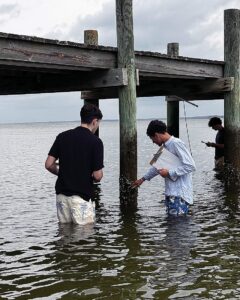
Students in Franklin Bell’s Honors Ecological Research Class collect samples at the school’s waterfront and dock. They are studying how organisms are arranged vertically in the intertidal zone based on their ability to tolerate environmental conditions such as wave action, desiccation, predation, or competition between different species.
For the first time, nine students from Christchurch School have submitted research papers to the Virginia Junior Academy of Sciences (VJAS) for publication this year. All nine papers were accepted for presentation as well. These students conducted their research under the guidance of faculty member Franklin Bell while taking the Honors Ecological Research class which also offers dual enrollment credit through Virginia Wesleyan University.
Mr. Bell noted that this class incorporates the school’s core values of character, curiosity, and community as well as the science department’s scope and sequence with its emphasis on student initiated design, implementation, and presentation of research. Students are innately curious about their surroundings and this class allows them to pursue their own individual interests while learning about major ecological principles. Learning how to conduct research and correctly analyze data is an important skill for students. But just as important is learning how scientists communicate their findings with others in their community. Science is not conducted in a vacuum, it is important for students to learn how to write up and present their findings. Hence the importance of publishing and why it is critical for our future leaders to submit papers to the VJAS and to present their findings.
The Ecological Research class is a project-based course open to 11th and 12th graders with students participating in ongoing field-based research. Projects include year-to-year monitoring of variables in local ecosystems, for example, water quality in Urbanna Creek or carbon sequestration in trees on the school campus. Some projects continue year-to-year, and some are completed within a single school year. Students assess methods from years past to revise or reinvent methods as needed or propose their own projects. Some begin a project in their 11th grade year and complete it in their 12th grade year. Students work towards publishing their work through the VJAS or other appropriate outlets.
Below is a summary of the nine research projects submitted to the VJAS this year:
Abigail Fannin (Hayes): A Study of the Difference in Birdsong Frequencies Between Urban and Rural Locations
Reagan Harding (Reedville): The Impact of Anthropogenic Noise on Wildlife Biodiversity in Three Different Locations on the Christchurch School Campus
Harrison Hinton (Wicomico Church): Measurement of Biodiversity of Forage Species in the Lower Rappahannock River with Minnow Pots
Emma Ho (Ho Chi Minh, Vietnam): Carbon Capture and the Environment Impact of No-Mow Zones and Forests to Mitigate Greenhouse Gases
Cecelia Jablonsky (White Stone): Examination of Ants on a Local School Campus Looking at Invasive Species
Madeline Janzen (Atlante, GA): A Study on the Impacts Made from a Single Reef Compromised by Crassostrea virginica (Virginia Oyster) on the Water Clarity in the Rappahannock River
Addie Kosek (St. Stephens Church): The Influence of Moon Phases on Nocturnal Animal Activity at Christchurch School
Adelaide Matzky (Rochester, NY): An Analysis of Three Years of Growth and Carbon Sequestration in Trees at Christchurch School
Rowan Toner (Ottawa, Canada): The Health of American Oysters at Christchurch School’s Waterfront.

Loading Comments